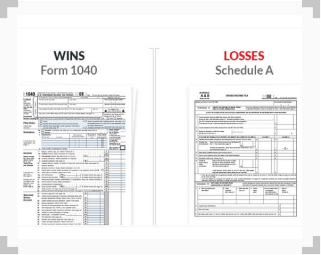Gambling Losses Tax Form
Author
- Tax Form For Gambling Losses
- Tax Forms For Gambling Losses
- 2019 Tax Forms Gambling Losses
- Gambling Losses On Tax Form
However, the same tax deduction on gambling losses limit applies. Professional gamblers will use the IRS tax form 1040 Schedule C or Schedule C-EZ to report the gambling losses. If you file IRS tax form 1040A or 1040EZ, you will not be able to claim tax deduction for your gambling losses. Reporting gambling income on tax return. Gambling Losses are reported on Form 1040 Schedule A as a Miscellaneous itemized deduction. Gambling losses are not a one-for-one reduction in winnings. Your total itemized deductions reported on Form 1040 Schedule A must be greater than the standard deduction for your filing status to have any tax benefit.

Do you roll the dice? Enjoy the slot machines? Even as a casual gambler, your winnings are fully taxable and must be reported on your tax return. Learn more about how the Tax Cuts and Jobs Act impacts gambling.

There are unique considerations when it comes to disclosing gambling wins and losses on your tax return….modified recently under the Tax Cuts and Jobs Act (TCJA). If you gamble, make sure you understand the tax consequences.
First off—what counts as gambling in the eyes of the IRS?

Gambling income includes (but is not limited to)
- Winnings from
- Lotteries
- Raffles
- Horse races
- Casinos
- Cash winnings
- Fair market value of prizes (like cars and trips)
The general rules
Wins
You are required to report 100% of gambling winnings as taxable income on your 1040. In addition, all complimentary offerings provided by casinos and gambling establishments must also be included in winnings. Winnings are subject to your federal income tax rate (though rates have been reduced under the TCJA-check out our blog, 2018 Tax Reform Provisions for Individuals for more on this).
Also, if you receive a certain amount of gambling winnings or if you have any winnings that are subject to federal tax withholding, the payer must issue you a Form W-2G “Certain Gambling Winnings”.
In other words, the payer is required to issue you a W-2 G if you receive (according to the IRS).
- $1,200 or more in gambling winnings from bingo or slot machines;
- $1,500 or more in proceeds (the amount of winnings minus the amount of the wager) from keno (a game of chance similar to lotto);
- More than $5,000 in winnings (reduced by the wager or buy-in) from a poker tournament;
- $600 or more in gambling winnings (except winnings from bingo, keno, slot machines, and poker tournaments) and the payout is at least 300 times the amount of the wager; or
- Any other gambling winnings subject to federal income tax withholding.
Losses
Gambling losses can be written off as miscellaneous itemized deductions. The gambling loss deduction is limited to the extent of your winnings for the year and excess losses cannot be carried forward to future years.
Under the TCJA, misc. deductions subject to the 2% of adjusted gross income floor are not allowed, however certain deductions (including the gambling loss deduction) are still deductible.

However, since the standard deduction for 2018 was nearly doubled by the TCJA, many taxpayers may no longer benefit from itemizing, seeing as itemizing saves tax only when the total itemized deductions exceed the applicable standard deduction.

How do you claim a deduction for gambling losses?
Recordkeeping is key!
To deduct gambling losses, you must document:
- The date and type of gambling activity
- The name and address of the gambling establishment
- The names of anyone who was present with you at the gambling establishment
- The amount won or lost
**You can document gambling on table games by recording the number of the table you played and retain statements showing casino credit issued to you. As far as lotteries go, you can use winning statements and unredeemed tickets as documentation.
Tax Form For Gambling Losses
Key takeaway
The TCJA adds limitations to the gambling loss deduction — you can now only deduct losses up to the amount of your winnings. Any excess loss cannot offset other highly taxed income. Thus, those in the trade or business of gambling, may no longer deduct non-wagering expenses, such as travel expenses or fees, to the extent those expenses exceed gambling gains.
Tax Forms For Gambling Losses
Questions? Contact us.
The TCJA…So Many Changes, So Many Questions…we can help you navigate this huge tax overhaul! Visit our Tax Reform Center for everything you and your business need to know, now.
Newsletter
2019 Tax Forms Gambling Losses
Get KLR updates delivered to your inbox.
Subscribe